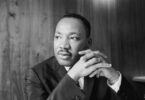Editor’s note: In celebration of Black History Month in February, PRSA invited prominent public relations professionals to offer their views and ideas for achieving greater racial and ethnic diversity in the profession as well as what Black History Month means to them. A compilation of previous PRSA Black History Month blog posts can be found here.
When asked if I might be interested in producing a Black History Month piece for this blog I immediately accepted.
Briefly, let me share with you my personal discovery that now makes Black History Month personal for me. As with many African Americans I knew fragments of my family history. My sister and I got bits and pieces from our parents and other relatives. That information was woefully deficient compared to the comprehensive data and evidence that surfaced after my cousin Denise Lester actually moved to Richmond, VA and began serious research of the Woolfolk family history. What she uncovered generated emotions ranging from sadness to empathy to absolute pride.
From the records available in Richmond, VA and surrounding counties, the white Woolfolk men were sheepherders long ago in Wales. In the early 18th century brothers Robert and Richard Woolfolk arrived in America from Wales. Robert settled in Caroline County, Virginia. Richard in the Holly Hill area. Through marriages and children the Woolfolk family grew and also settled around Richmond, Virginia and in Kentucky. There is even a Woolfolk family crest that can be traced back to the late 1600s.
Historic records indicate that in January 1791 “Peter a negroe fellow was sold to John G. Woolfolk for the sum of fifty pounds.” Later records dated 18 August 1808 note that John’s will left an “old” Peter and a “young” Peter to his son Jourdon Woolfolk living in Caroline County. Unfortunately, detailed records were not kept and information was collected from available historical documents. However, recent DNA samples from my father, Peter C. Woolfolk, Sr.– now 98 years old– determined his descendants were from the Republic of the Ivory Coast in Africa.
Along the way the “young” Peter and his family had learned to read. He married three times and produced eleven children. His first daughter, Maggie, became a teacher at the Freedman’s Bureau and one of the first “Colored” teachers in Richmond, Virginia. Somewhere along the way the “young” Peter became a Confederate prisoner of war eventually being released in 1865 after the fall of Richmond in the Civil War.
Under the harsh circumstances of the time Peter Henry Woolfolk overcame barriers and managed astounding accomplishments for a former slave. He has a letter, dated April 22, 1865, published in the Freeman’s Record outlining his experience as a school teacher. In 1871, local school board records lists him as one of the first colored teachers in Richmond receiving a salary of $50 per month. Peter Henry met another colored teacher in the school , Otway Steward. Together they co-founded the first colored newspaper in Virginia, the Virginia Star (1877 to 1888). A May 11, 1878 copy of the newspaper’s front page prominently lists Woolfolk and Steward as editors. He didn’t stop there.
From 1881 to 1884 Peter Henry is listed at the “Grand Worthy Secretary of the United Order of True Reformers.” He and another member were the only two that could read and write at the time. Noted in a “Study of Negro Problems” presented at Atlanta University, May 1904, The True Reformers was one of the most remarkable Negro organizations in the country. They created one of Richmond’s largest insurance companies—The Grand Fountain– with Peter Henry as its secretary.
As a leader of the True Reformers, Peter Henry was also helped co-found the True Reformers first black-owned bank in Richmond in 1889. Because of its entrepreneurial spirit Richmond was then known as “the Birthplace of Black Capitalism” and the Black Wall Street.
A man of faith, Peter Henry was a member of Richmond’s Third Street Bethel AME Church, considered one the two most historic churches in Virginia. The church is now listed on the National Historic Register and the Virginia Landmarks of Black History. Passing away in 1896 a newspaper notice said, Peter Henry was known as “a Christian gentleman, honest in his dealings and careful of the rights of others. He became a favorite with all classes.”
Peter Henry Woolfolk was such an intriguing Black person in his day historians are consistently writing books and conducting studies on his participation in black affairs in Richmond’s post-Civil War era.
From being a former slave to becoming a teacher, co-founding a newspaper, an insurance company and a bank during these particularly repressive times is a testament to the resolve and vision of my great grandfather.
While I am pleased to have been a press secretary to three Members of Congress and to also receive an appointment in the administration of President Bill Clinton I can fully appreciate how the path for opportunities for me and all other African Americans was prepared by our ancestors and the Civil Rights movement. For that I am most thankful.
Peter C. Woolfolk, a native of Washington, DC, now lives in the Nashville, Tenn area. He is president of Communications Strategies, an award-winning public relations and public affairs firm. He can be reached at : pwoolfolk@commstratenn.com







There’s something incredibly humbling about reading such a rich family history. I have a family history that I am sure has seen its share of White Privilege and the unfortunate struggle for racial power in the past. Sometimes when I stop to think about the ongoing struggle for equality, I am ashamed of a country that allows such a divide to exist so many years later. Stories like these of extraordinary families rising above adversity really puts it into perspective. Your family is an inspiration on the most basic human level. Reading this, I found myself wishing I had so much momentum in my own family. But the most important thing I see here is a place for hope, a hope that the divide will keep growing smaller. Someday I truly hope people will start seeing diversity as much more than a political point or a point of contention and begin to see how diverse people are changing the world in powerful ways.